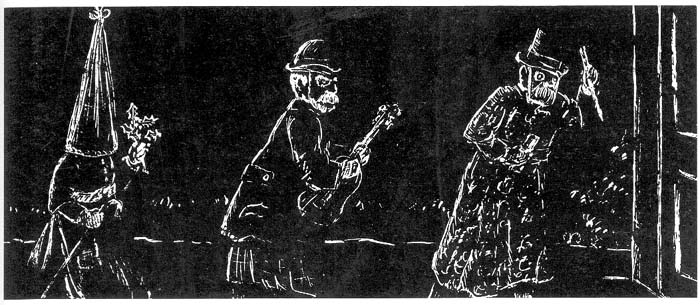
THERE is a thin tootle of flutes and tinny chord or two from a mouthorgan, the slam of our heavy iron front gate, and we know, even before we force our morning-after-the-night eyes open, that they have begun their rounds of the parish.
It is always thus on the morning of December 26th. More and more batches of Wren Boys will come, off and on, throughout the short day, for here in the West children still dress-up and "go round with the wren," though not so many as formerly.
There is the usual assortment of small boys, all well aware that we are still in bed. They wear a weird assortment of cast-off garments over their ordinary clothes. Fancy American shirts, faded summer dresses, that cling in all the wrong places and are most unfashionably long, even strips of best Nottingham-lace curtain have been dragged from the rag-bag for the occasion; anything goes arid the gaudier the better.
They carry an assortment of sticks; no self- respecting Wren Boy ever goes about unarmed, else how would he protect himself from cross ganders left with nothing to do except chase small fry, now that the geese have all gone the same way as the turkeys? Then, too, there are always the dogs that in the ordinary way may be friendly enough, but which cannot be depended upon to let a fellow pass when he appears dressed up in a skirt borrowed from the girl next door. As well as these hazards, there is always the even more serious threat to the "kitty". Some fellows are not a bit particular about whose money they spend when all is over, and one must hold on to one's own, and be ready to fight for one's rights when the need arises.
The authentic Wren Boy's outfit should be completed by a tall straw head-dress. Nowadays, one is more likely to see the youngsters wearing ancient bowler hats, green with age from good- ness only-knows where. There is a certain skill required in the making of the tall, pointed straw hat, and like so many other old crafts, this one seems to be dying out.
Barley straw was considered best for making the cone shape, though any straw would do. The hat was from two to three feet high, and was always finished off at the top with three loops of finely plaited straw. The wide end fitted down over the head, and the wearer could see and breathe quite well inside, though the head-dress might be removed when he was negotiating fences on his way across fields, or when he thought he was unobserved.

The Wren Boys who have not been able to lay their hands on one of these straw affairs must provide himself with a mask or false-face to hide his features from those who might know him all too well. Masks are plentiful in the shops and some fo them find their way into Christmas stockings, and get their first airing on St. Stephen's Day.
Formerly, Wren Boys were expected to sing and dance when they came to one's door, but the urchins who come now only mumble a few words... "The wren, the wren, the king of all Birds, St. Stephen-ses Day he was caught in the furze," they say, but they never carry a wren with them. Neither, for that matter, do they know what that little bird has to do with this day, and there no longer seems to be anyone to tell them.
Some years ago, the older boys and young men used to dress up and go about in groups of may be twenty strong. They always brought a fiddler or two along, and when they entered a house they jigged merrily through a few figures of some set dance, much to the delight of the children, but not without some misgiving on the part of the woman of the house, whose best plates and jugs were in some peril on the kitchen dresser. Then they chanted a few verses about the wren (which they pronounced "wran," as even our present-day youngsters still do) and finished up with a call to "fill up the kittle and down with the pan," and "Hie up, landlady, and! '" give us a treat.
This was a broad hint for a meal, or its equivalent in cash, and they seldom went away empty. At the end of the day, the Wren Boys would pool their takings and maybe hold a party in some country kitchen on the proceeds. Nowadays it is ' mostly children of schoolgoing age who do the rounds, though in the larger towns young fellows., may still dress up and visit the hospitals and other institutions, to give a sing-song for the inmates, in much the same way as the carol-singers do.
The little band on our doorstep must have their pennies, or we shall never get another wink of our holiday sleep. !
"Pinny for the wran," calls the cracked voice of the tallest one, and the less confident trembles at the rear backing him up.
We try to engage the lads in a little light banter, and we demand music, for Christmas or no Christmas, we must have value for our money. Raggedly they strike up 'Phil the Fluther" on the tin whistles and mouthorgans, with "Macan-a- mara's Band" for an encore. What they lack in harmony is made up in verve.
This is no time for remembering trampled flower-beds, stray catapult-shots and footballs that landed inexplicably in the middle of a promising border of forget-me-nots. Pay up and look cheerful.
